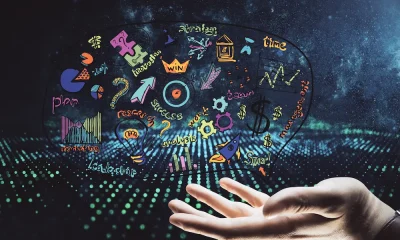General
Unleashing Business Potential: The Matrix’s Teachings

“The Matrix” is a science fiction film that can offer engaging lessons for businesses, particularly in innovation, strategy, and leadership.
This article looks at the basic concepts and themes of the movie and the teachings for entrepreneurs and businesses. We have also added how “The Matrix” can be related to real-life ideas, including Web 3.0 technologies. Let’s start with the basic understanding of “The Matrix.”
The Matrix Basics
The basic concept of “The Matrix” is that humans are all in an induced comma housed in our little dream capsule. A vast machine controls our thoughts and all our stimulus. The machine captures the energy we produce by interacting with this made-up world. We are, in fact, batteries. However, a small group of humans escaped their dream capsule and fought the machine.
It’s a brilliant concept, and is it really science fiction? Well, there are parallels with life as we know it, so the Matrix does exist.
Business Lessons From The Matrix
The themes and concepts explored in “The Matrix” movie can be inspirational and thought-provoking. From a business viewpoint, there are many lessons for businesses and entrepreneurs, including self-belief, focus, vision, and continuous learning by questioning the status quo.
Questioning The Status Quo
In “The Matrix,” the protagonist, Neo, questions the reality presented to him. Similarly, you must ask the status quo to leave your job, become self-employed, or start a business. Innovation often comes from challenging existing norms and processes.
Outside-the-Box Thinking
Neo’s journey involves thinking beyond the constraints of the system. Successful startups often thrive on thinking outside the box. Creative problem-solving and unconventional approaches can set a business apart in a competitive landscape.
Embracing Change and Adaptability
“The Matrix” is a story of constant change and adaptation. Businesses operate in dynamic environments and need to be adaptable to survive. Being open to change and quickly adapting to new circumstances is crucial for success.
Tech Innovation and Integration
The Matrix is heavily focused on technology and its integration into daily life. Businesses need to stay ahead in terms of technological innovation to remain competitive. Embracing new technologies can improve efficiency and open up new opportunities.
Team Collaboration
Neo’s success depends on the collaboration of his team. In the business world, teamwork is essential. Collaboration and fostering a positive team culture can enhance productivity and improve outcomes.
Ethical Considerations
The Matrix raises ethical questions about the use of technology and control. Businesses should consider the ethical implications of their actions, products, and services. Maintaining ethical standards builds trust with customers and stakeholders.
Continuous Learning
Neo undergoes intense training to acquire new skills. Businesses should encourage a culture of continuous learning and skill development. Staying updated with industry trends and fostering a learning environment can lead to long-term success.
Balance Between Reality and Virtuality
The movie explores the concept of a simulated reality. It’s essential to balance the virtual (e.g., online presence, digital marketing) and the real (physical products, in-person experiences) to create a holistic and practical business model.
Blue Pill, Red Pill
Getting back to the movie – it is a work of fiction, but it’s hard to argue The Matrix doesn’t exist. Our environment or society, where everything is predetermined, controlled, and repetitive, must have inspired the movie script, where there is a lot of predictability to life, including:
- Go to school and get a good education
- Get a good job and work hard to get a better-paying job
- Get married, buy a house, and have children
- Tell your children to get a good education, a good job, get married, have children…
We are never taught that there is another path you can take.
Society needs most of us to follow the predetermined pattern of life because if we all knew about the other side, who would work in boring jobs?
Who would work for a boss? Who would worry about redundancy? Who would blindly get married and have children without thinking?
However, there is another side for the risk-takers. Leaving your job, starting a business, inspiring others to join your company, and so on breaks the mold and needs outside-the-box thinking.
So, will you take the red pill or the blue pill?
Real-Life Similarities
Today, “The Matrix” is more relatable than ever before due to the increasing use of AI, VR, and AR. Additionally, we are accepting more surveillance than ever before. Let’s start with VR and AR.
Virtual Reality (VR) and Augmented Reality (AR)
It won’t be long before Web 3.0 and the Metaverse gain momentum, as the technology (AR and VR) is on the verge of catching up.
Once it does, with the Metaverse, we will find ourselves fully immersed in a simulated world reminiscent of the one portrayed in “The Matrix,” it will be impossible to overlook the similarities.
Simulation Theory
While some may consider this concept a little far-fetched, in business, individuals and organizations often operate based on their perception of reality, which may be influenced by factors such as market trends, consumer behavior, and industry dynamics.
Similarly, in “The Matrix,” humans are plugged into a simulated reality, and their perceptions are manipulated to believe in a world that is not real.
It’s not just in business either; in some circles, you’re likely to find some philosophers and scientists discussing the possibility that our reality might be a simulation created by a higher intelligence. The world as we know it could be a sophisticated computer program!
Artificial Intelligence (AI)
In “The Matrix,” machines have achieved artificial intelligence to control and manipulate human perceptions.
Many people fear AI and its advancement, which raises ethical and existential questions about the potential consequences of creating intelligent machines.
The movie is a cautionary tale about the risks associated with unchecked AI development and how it could access our private data and control us n many ways.
Social Control and Manipulation
In The Matrix, individuals’ minds are controlled by external forces. In real life, discussions about surveillance, social media manipulation, and the potential misuse of technology shed light on our concerns regarding the control and manipulation of information, which can affect individuals and societies.
For example, social media platforms use AI algorithms to curate and personalize content based on user behavior. AI technologies can be used to generate convincing fake news articles or deepfake videos, making it challenging to distinguish between actual and manipulated content.
Advertising Content
Advertising has always been designed to target individuals and influence our behaviors. The intention may not always be to manipulate negatively; the goal is often to increase engagement, drive sales, or promote specific products or services.
AI in advertising offers positive and negative experiences. Personalized advertising powered by AI can enhance user experience by showing relevant content and offers.
On the other hand, privacy concerns, the potential for creating filter bubbles (where users are only exposed to information that aligns with their existing beliefs), and manipulating emotions for commercial gain have also been raised.
This is where data protection rules and guidelines are important – to enable users to control their privacy settings and know how their data is being used. However, advertising is just the beginning of how AI is used to manipulate our actions.
Final Thoughts
If you’re still doubting the Matrix exists, consider the popular context of what “The Matrix” really is and not only in popular culture, i.e., “The Matrix,” a 1999 science-fiction movie directed by the Wachowskis.
In the movie, “The Matrix” is a simulated reality created by machines to subdue and control humans. But also in philosophy, “The Matrix” refers to the idea of an illusory world or reality, like the simulated reality in the movie. This concept has been explored by philosophers such as Descartes and Baudrillard.
In life and in business, keeping an open mind presents opportunities. Like Descartes, question everything and take calculated risks to get ahead and achieve your goals.






